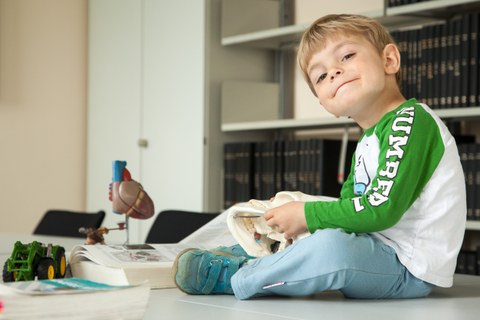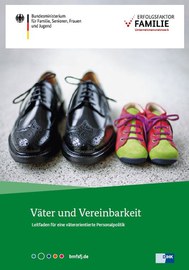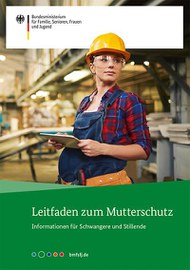Family friendliness
In Central Europe, our understanding of what makes a family has changed many times over the years. The most recent phase could be described as an broadening of the traditional family, made up of a man and a woman with one or more biological children, to include other unions of adults who take on the responsibility of caring for children. Having a direct caregiver is essential for the development of every child. The recognition of this fact has led more people to take the role of a parent seriously, which in turn requires resources that are not always adequately represented in the traditional work environment.
Table of contents
Engaged fathers
The distribution of roles is a socializing element, instilled in children from an early age. It is important that parents share familial roles and tasks equally wherever possible if children are to recognize all genders as equal. But what exactly is a father’s role in comparison to a mother’s? It takes time and experience to to avoid falling into old patterns. We take the role of father seriously and support all people who are doing their best in fulfilling this role.
An indispensable prerequisite is the understanding (especially at management level) that supporting families offers advantages to all involved. At the Faculty of Medicine, there are two distinct groups to take into account here: Researchers and staff who do not have contact with patients and doctors, nurses and staff who do have contact with patients. Especially with regard to clinical work, there are problem areas that are less of a concern in the research and theory area. These include the different variations of shift work and the increased potential for stress due to contact with others and responsibilities to others. Two other problem areas are work flexibility and a pronounced hierarchical structure. The first step is to analyze these four problem areas in detail and to develop alternative methods of thinking, which can then be tested out.
In addition to the structural aspects, a survey (in German) should be used to probe what information and support staff need, the results of which can ideally be used to create an interesting and useful support service.
Maternity Protection and Parental Leave
The Maternity Protection Act (Mutterschutzgesetz) was revised on January 1, 2018, and expanded to include pregnant students and pupils for the first time alongside pregnant members of staff. The law stipulates that a general risk assessment must be conducted for all workplaces and courses, and that the individual risk for every pregnant or nursing person must also be documented. Depending on the result of the risk assessment, the employment or course of study will either be deemed safe to carry out without risk or subjected to special protective measures, or an alternative employment or teaching service must be offered. If risk is unavoidable and adequate protective measures or an alternative are not possible, a ban on continued employment or attendance of a course may also be imposed in order to protect the pregnant person and the unborn child. Staff can find more information in the UKD intranet and students can find out more in the service area of the ePortal. Members of staff who want to inform us of a pregnancy should please contact their supervisor for guidance on the next steps. Students should please contact Ms. Sylvia Wünsche: . Should you experience discrimination in conjunction with your pregnancy, please contact us!
Study: Students with children at our Faculty
The results of an online survey on balancing familial duties with studies at our Faculty (PDF) show that students with children:
- are on average older and live outside of Dresden,
- rely on their local family network for childcare support,
- need to spend more time balancing their studies with their everyday life and are therefore on average more structured and disciplined in their studies,
- have less time for independent study and learning processes,
- need a lot more time to finish their studies and on average have worse exam results
than students without children. Students with children mostly want better childcare facilities, particularly in close proximity to the campus, a one-stop consultation service covering all aspects of studying when you have a child as well as curricular support from the Faculty. The Faculty acknowledges these needs. For several years, we have actively brought students with familial obligations together in parent seminar groups, so as to assign them class times outside of the drop-off and pick-up times of daycare centers, for example. Moreover, family friendliness will also be given more consideration with regard to examinations in the future. The student initiative Medi-Eltern Dresden offers a platform for discussion and mutual support.
Additional information
Research into family friendliness
What makes a university family-friendly? What measures best help balance a degree or academic career on campus with starting a family or meeting familial responsibilities? You will find more German-language resources on family-friendliness at universities from CEWS (Competence Center for Women in Science and Research) here: CEWS: Family-friendly research
Care counseling service at TU Dresden
TU Dresden has introduced a care counseling service which is geared towards students and staff with children or relatives needing care. You can access this service on campus or at home and attend informative presentations and seminars: Care counseling service at TU Dresden
Information on fathers in and around Dresden
On Papaseiten, (expectant) fathers, companies and professionals in and around Dresden can find tips and event information relating to becoming and being a father, parental leave, child support and much more.
Contact
Would you like to know what support work for dads entails? Do you have suggestions, ideas, desires or concerns? I would be happy to hear from you and am always available on short notice for a chat with you.
 © Michael Kretzschmar UKD
© Michael Kretzschmar UKD
Fakultät Medizin
NameMr Prof. Dr. med. C. Albrecht May
Stellvertretender Gleichstellungsbeauftragter
Send encrypted email via the SecureMail portal (for TUD external users only).





